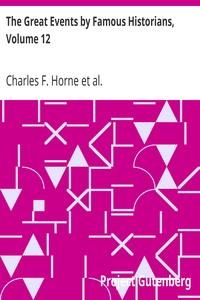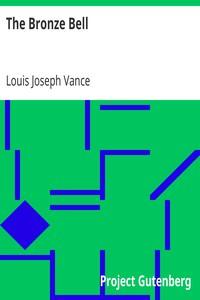Read this ebook for free! No credit card needed, absolutely nothing to pay.
Words: 153485 in 31 pages
This is an ebook sharing website. You can read the uploaded ebooks for free here. No credit cards needed, nothing to pay. If you want to own a digital copy of the ebook, or want to read offline with your favorite ebook-reader, then you can choose to buy and download the ebook.


: The Great Events by Famous Historians Volume 12 by Horne Charles F Charles Francis Editor Johnson Rossiter Editor Rudd John LL D Editor - World history
%AN OUTLINE NARRATIVE%
Tracing Briefly The Causes, Connections, And Consequencies Of
%THE GREAT EVENTS%
CHARLES F. HORNE
At first the young monarch found life very bright around him. His courtiers called him "the rising sun," and his ambition was to justify the title, to be what with his enormous wealth and authority was scarcely difficult, the Grand Monarch. He rushed into causeless war and snatched provinces from his feeble neighbors, exhausted Germany and decaying Spain. He built huge fortresses along his frontiers, and military roads from end to end of his domains. His court was one continuous round of splendid entertainments. He encouraged literature, or at least pensioned authors and had them clustered around him in what Frenchmen call the Augustan Age of their development.
The little German princes of the Rhine, each of them practically independent ruler of a tiny state, could not of course compete with Louis or defy him. Nor for a time did they attempt it. His splendor dazzled them. They were content to imitate, and each little prince became a patron of literature, or giver of entertainments, or builder of huge fortresses absurdly disproportioned to his territory and his revenues. Germany, it has been aptly said, became a mere tail to the French kite, its leaders feebly draggling after where Louis soared. Never had the common people of Europe or even the nobility had less voice in their own affairs. It was an age of absolute kingly power, an age of despotism.
England, which under Cromwell had bid fair to take a foremost place in Europe, sank under Charles II into unimportance. Its people wearied with tumult, desired peace more than aught else; its King, experienced in adversity, and long a homeless wanderer in France and Holland, seemed to have but one firm principle in life. Whatever happened he did not intend, as he himself phrased it, to go on his "travels" again. He dreaded and hated the English Parliament as all the Stuarts had; and, like his father, he avoided calling it together. To obtain money without its aid, he accepted a pension from the French King. Thus England also became a servitor of Louis. Its policy, so far as Charles could mould it, was France's policy. If we look for events in the English history of the time we must find them in internal incidents, the terrible plague that devastated London in 1665, the fire of the following year, that checked the plague but almost swept the city out of existence. We must note the founding of the Royal Society in 1660 for the advancement of science, or look to Newton, its most celebrated member, beginning to puzzle out his theory of gravitation in his Woolsthorpe garden.
CONTINENTAL WARS
Louis's first real opponent he found in sturdy Holland. Her fleets and those of England had learned to fight each other in Cromwell's time, and they continued to struggle for the mastery of the seas. There were many desperate naval battles. In 1664 an English fleet crossed the ocean to seize the Dutch colony of New Amsterdam, and it became New York. In 1667 a Dutch fleet sailed up the Thames and burned the shipping, almost reaching London itself.
Yet full as her hands might seem with strife like this, Holland did not hesitate to stand forth against the aggression of Louis's "rising sun." When in his first burst of kingship, he seized the Spanish provinces of the Netherlands and so extended his authority to the border of Holland, its people, frightened at his advance, made peace with England and joined an alliance against him. Louis drew back; and the Dutch authorized a medal which depicted Holland checking the rising sun. Louis never forgave them, and in 1672, having secured German neutrality and an English alliance, he suddenly attacked Holland with all his forces.
Seeing the wonderful resistance that little Holland made against her apparently overwhelming antagonists, the rest of Germany took heart; allies came to the Dutch. Brandenburg and Austria and Spain forced Louis to fall back upon his own frontier, though with much resolute battling by his great general, Turenne.
Next to young William, Louis found his most persistent opponent in Frederick William, the "Great Elector" of Brandenburg and Prussia, undoubtedly the ablest German sovereign of the age, and the founder of Prussia's modern importance. He had succeeded to his hereditary domains in 1640, when they lay utterly waste and exhausted in the Thirty Years' War; and he reigned until 1688, nearly half a century, during which he was ever and vigorously the champion of Germany against all outside enemies. He alone, in the feeble Germany of the day, resisted French influence, French manners, and French aggression.
Free books android app tbrJar TBR JAR Read Free books online gutenberg
More posts by @FreeBooks








